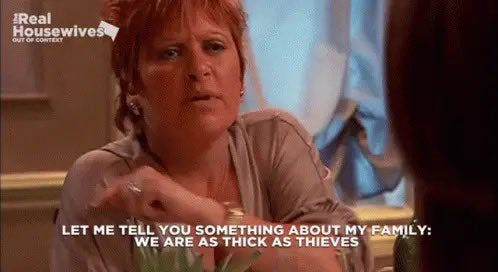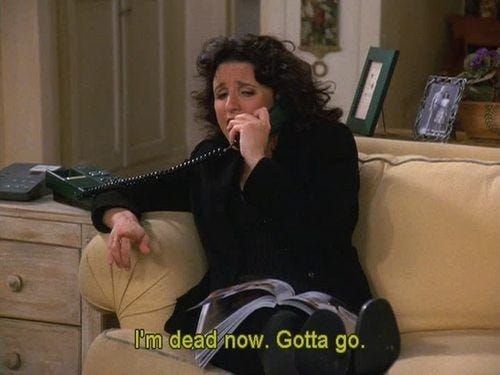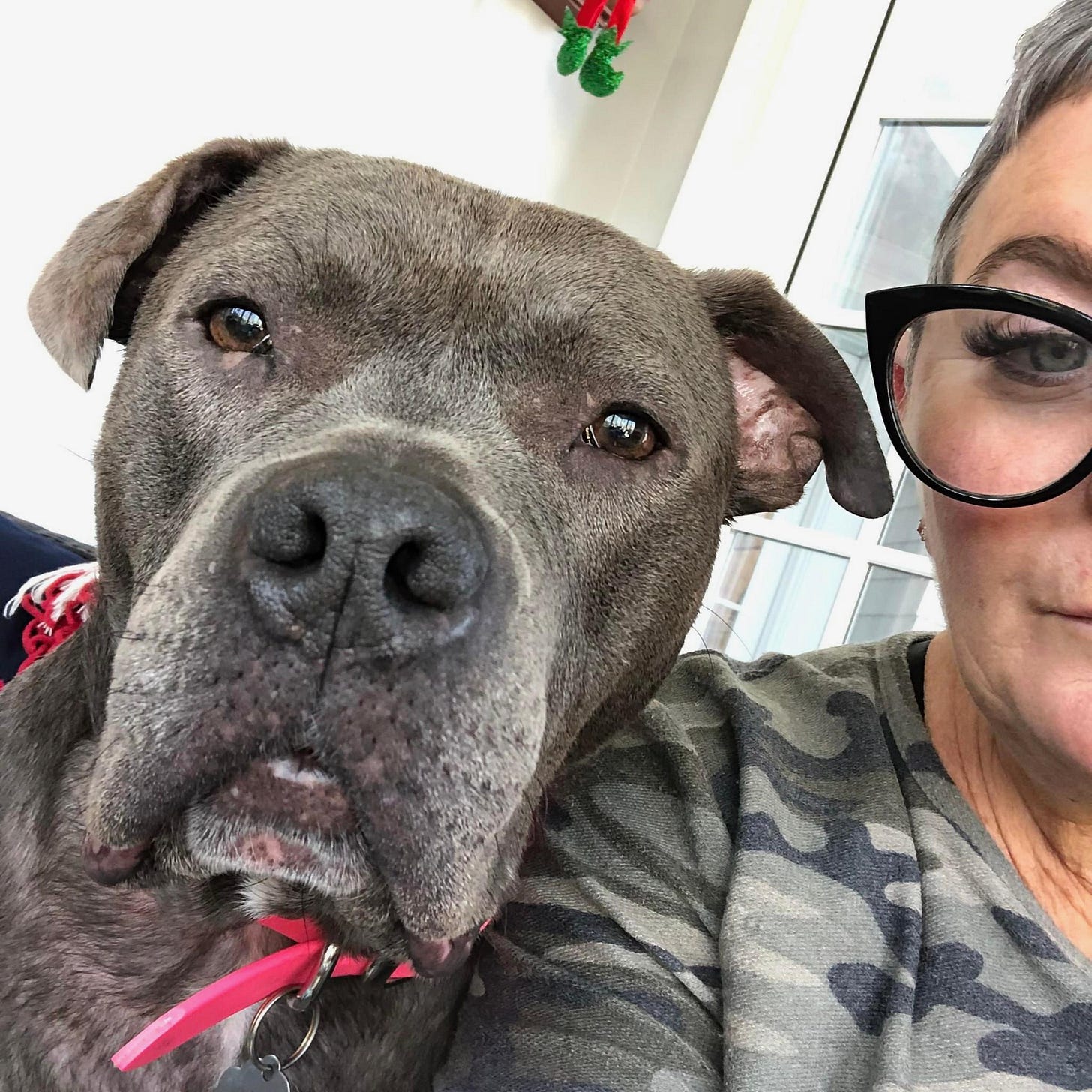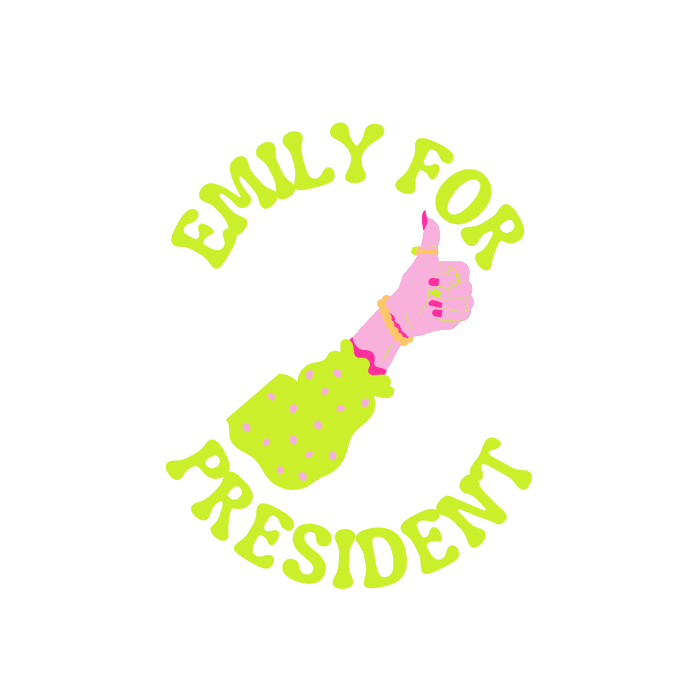This post is too long to appear in full in your inbox. I don’t know where it will cut off in the email version, but it will be available online. See you there!!!
Odds are, if you know me then you know my mom. As former Real Housewife Caroline Manzo once so aptly put it, “Let me tell you something about my family. We’re thick as thieves,” which is actually a quote I learned from my mother.
While I’ve talked with her twice here before on Emily For President, today I wanted to have my mom on for a Mother’s Day special in the hopes of being crowned her favorite child. This week, Danielle Sharp and I discussed our respective relationships with motherhood, the crises facing mothers in America today, and whether she even likes me or not. (Spoiler alert: she does!)
It’s Giving Mother
I have a vivid mental catalog of the moments throughout my life in which I felt embarrassment in all its awful splendor. Sometimes, this makes me feel as though my brain is bullying the rest of my body with Cher’s “If I Could Turn Back Time” playing off in the near distance.
But sometimes I get a rare joy of adulthood: retrospective kindness for my younger self. In one such moment, I’m in my fifth-grade classroom with my peers gathered together as we observe something on one of those light projectors that was already ancient in 2008. In response to some statement since lost to the ether, I say: “Well, I tell my mom everything. She’s my best friend.”
Recalling the moment now brings with it a surge of self-righteousness and comfort—how iconic it was to have grown up knowing I always had someone in my corner—but as the memory goes, my comment was met with a scoff from one of the most popular girls in the grade. Rather than just kill me with her bare hands, she followed that rebuke with her final verdict: “That’s so weird.”
For years—years!—after, I couldn’t stop turning this assessment over in my mind. Was it so weird? I really didn’t think so: my mom wore cheetah print and sang Pat Benatar in the car and let me watch SNL when I couldn’t sleep. By my ten-year-old standards (and let’s be real, by my standards today), my mom was the shit! Of course, I wanted to be her best friend! Who wouldn’t?
Pre-adolescence will do terrifying things to a girl and for all I know, maybe this comment was a reflection of that girl’s relationship with her own mother. Probably, though, none of it mattered to her outside of that moment and I’m trying to cast meaning onto something I’ve lugged around with me for 16 years. In any case, I’m glad my embarrassment didn’t drive a wedge between my mom and me, not least in part because I don’t know who else I would have called this morning at 7:16 am to ask if it looked like I was having an allergic reaction to a skincare product.
While I know how much I value our relationship, I wanted to ask my mom about her relationship with motherhood in general. With that, I asked:
Emily: What have been some of the highest highs and the lowest lows of motherhood?
Danielle: Highs are definitely seeing you and your siblings happy and succeeding in things that you do, like sports and jobs. But also when other people compliment my children and let me know they are good people doing good things, as well as knowing that you and Cal and Audrey appreciate me and want to spend time with me.
Lows are whenever one of you were sick, hurting, struggling, or stressed. To see your child in pain—any kind of pain—is the lowest of lows.
Emily: What is the funniest memory you have that encapsulates something about motherhood to you?
Danielle: It may not necessarily be funny, but I spent a good deal of time driving around the suburbs in my SUV with 2 and then 3 car seats in the back trying to get all of you to nap. I’m talking almost every day and for a significant period of time, just driving to get you guys to fall asleep. And then once you were asleep, I’d park in the garage and keep the garage door open to the house and CONSTANTLY check on you because, you know, you were in the garage!
Maybe the funny aspect of this is that I would drive by Harry Connick Jr’s house just about everyday. I’m surprised the security cameras didn’t red flag my license plate.
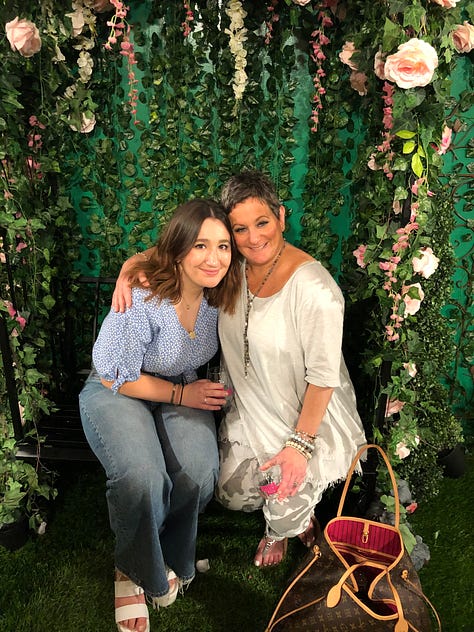
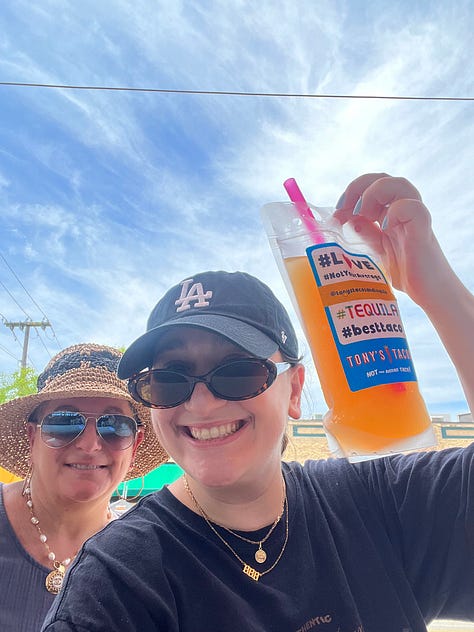

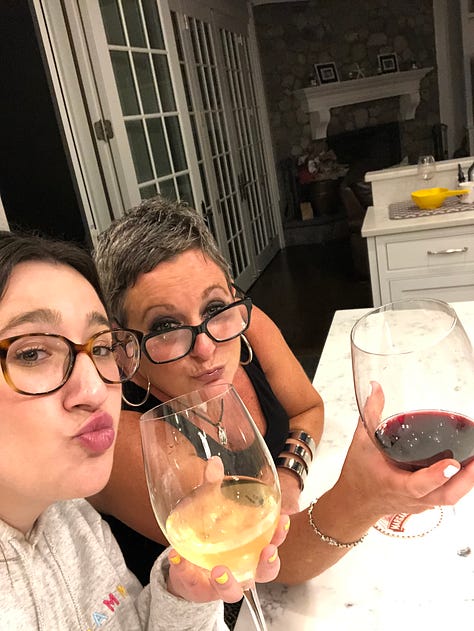
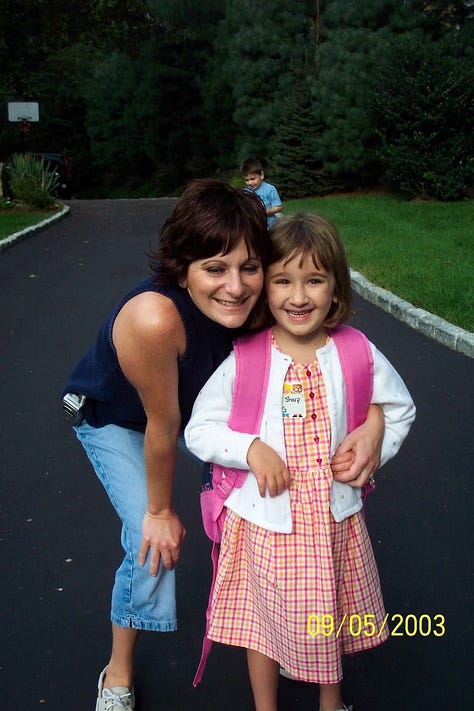
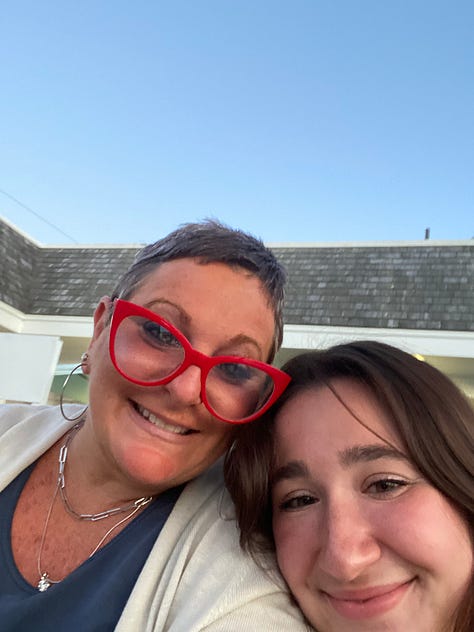
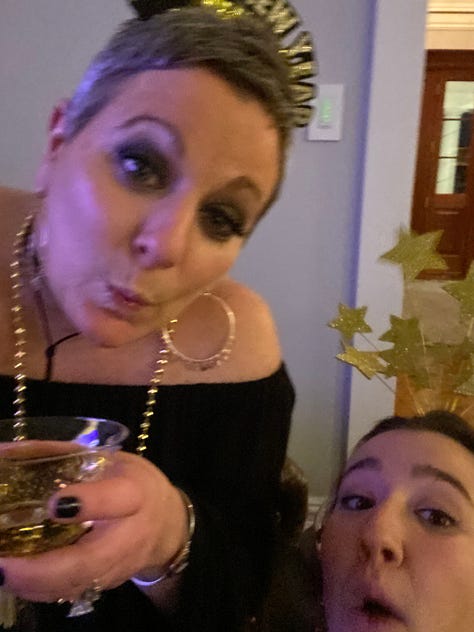
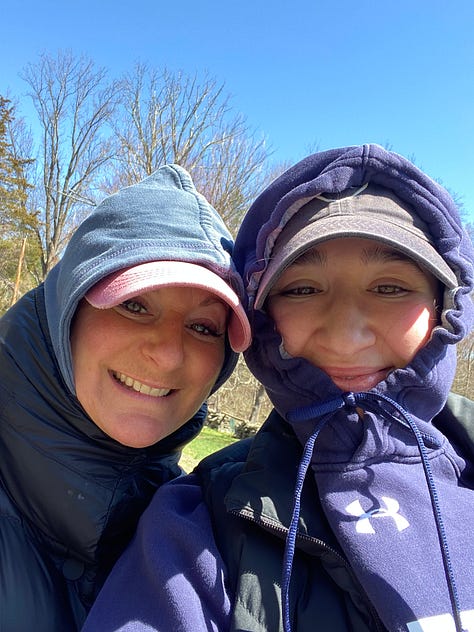
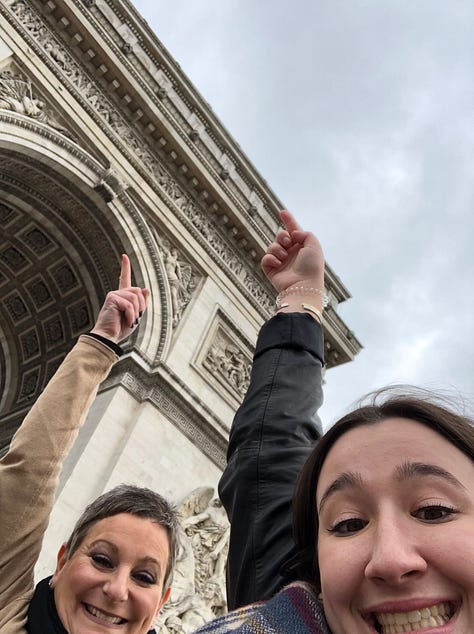
Emily: Did you always know you wanted to be a mother? If not, when did that happen for you?
Danielle: I was definitely not one of those women who always knew they wanted to be a mother or saw it as my main life plan. I knew I wanted to be a lawyer more than I knew I wanted to be a mother. I just figured if I met someone that I wanted to marry, that children would follow.
I’m not trying to be smug—I’m just trying to emphasize that being a mother wasn’t my end game.
When I was younger, I claimed that I wanted to have two children and adopt two children. No one ever asked me, I would just say that out loud whenever I felt like it. Over the past ten or so years, though, I’ve felt a growing aversion towards having kids at all. I want to be clear: this is not because it’s “trendy” to not want kids, although that is now the trend.
According to a survey published by The Times in the UK, “only 55% of Gen Z and millennials plan to have children. One in four of those surveyed, aged between 18 and 34, has ruled out parenthood entirely, with the most common reason cited being ‘wanting time for themselves’” (X). Freya India of UnHerd, a British slow journalism publication, speculated that this trend could be a result of “extended adolescence,” or the trend of Gen Z participating in less adult activities compared to other generations.
Other members of Gen Z have claimed that they don’t want to bring new life to a dying planet, that raising children has become too expensive for them to consider, or that they simply don’t want to. There’s a Childless By Choice movement, a trending hashtag on TikTok, and even celebrity representation—that’s how you know it’s legit.
In the years since realizing I don’t have any desire to have children, I’ve found that most people don’t care. Most other Gen Zs—whether they feel at all similar to me or not—recognize the fact that it’s my prerogative and are more curious than cruel. But for the rare few individuals who have told me that it’s “not fair to my family” to deprive them of grandkids because I am the sole provider of those across all of my siblings and cousins, of course, I wanted to ask my mom:
Emily: Mother, what are your honest thoughts on my desire to not have children?
Danielle: That is 100% your decision, your right, and your business!!! Everyone should have the right to decide if and when they choose to have a child.
Hold on…the decision to have a child…is my decision??? I thought that was the responsibility of my state legislators!!! Does Ron DeSantis know about this???
The Bleak Section (Sorry)
I fear it’s impossible to have an Emily For President conversation on motherhood without also talking about how the US is actively failing mothers. It should be impossible to have any conversation on motherhood without addressing the facts of this section but I digress.
We all knew the movement to overturn Roe v. Wade would not simply end with “leaving abortion access up to the states.” The goal has always been and will always be to restrict the freedoms of anyone who is not a cis man. That’s not even a dramatic statement anymore so much as a literal policy platform for this year’s election. What’s worse, some elected officials are celebrating the idea of relegating those who can bear children to doing just that.1
Back in February, after the Alabama Supreme Court decided2 that embryos are “children” and uteruses are “ancillary characteristics” and not only the Supreme Court could be “fucked up,” Senator Tommy Tuberville (R-AL) of the Tuberville Tuberdome said that he was all for the ruling because “we need to have more kids.” Upon finding out in real time that this decision led to families relying on IVF services to not have kids, Tuberville still managed to find a way to defend it.
But despite being wrong, Tuberville said the quiet part out loud…four times: the call to have more kids touches on the history of white supremacist ideology in the anti-abortion movement, namely that abortions stopped white Anglo-Saxon women from having kids so they should be banned to preserve the “white numerical superiority.” Kathleen Belew, a professor of history at Northwestern University, explained in 2019 that for modern white supremacists, “‘opposing abortion, opposing gay rights, opposing feminism, in white power discourse, all of this is tied to reproduction and the birth of white children.’”
We talked about the racism embedded in the anti-abortion movement on E4P before so while I won’t rehash the conversation in full again today, I did want to ask my mom:
Emily: What do you think of the people who claim to celebrate mothers and this notion of childbirth while also not protecting reproductive rights?
Danielle: I think it’s fucking ridiculous, stupid, and angering. Most of all it’s hypocritical. The way to celebrate mothers is to allow women to decide if and when they choose to become one. Forcing a woman to carry and bear a child she either does not want or cannot care for is relegating that woman to a second class citizenship and strips her of basic a civil right.
Emily: Do you think motherhood can be all of the positive things it is as well as a tool used to control women? Why or why not?
Danielle: Motherhood should be a positive thing, period. That’s why women should have the right to choose if and when they decide to become one. It is definitely being used as a tool to control women right now as it has in the past.
But I think women—whether they are mothers or not—will continue to fight against the restrictions on our reproductive rights. No one is lying down and going to allow this to happen. So yes, I think it can still be seen as a positive thing.
Protecting reproductive rights and the decision to choose when to have a child is only one part of this conversation. In the US, the maternal mortality rate has been significantly on the rise, with the Centers for Disease Control reporting last year that “the maternal mortality rate for 2021 was 32.9 deaths per 100,000 live births, compared with a rate of 23.8 in 2020 and 20.1 in 2019.”3 In simpler terms, 2021 saw a 40% increase in maternal mortality from the previous year (according to the most up-to-date reporting I could find) even though “84% of pregnancy-related deaths were deemed preventable” (X).
That is a sentence I have said out loud to myself at least five times since writing it, trying to make it make sense to no avail.
It probably won’t surprise anyone that this conversation disproportionately affects Black women. As the CDC report continued to explain “in 2021, the maternal mortality rate for non-Hispanic Black (subsequently, Black) women was 69.9 deaths per 100,000 live births, 2.6 times the rate for non-Hispanic White (subsequently, White) women” (X).
More to it, discrepancies in the mortality rates between Black and white children were equally as staggering. Last year, the New York Times studied data collected in California and found that race regardless of class (and, therefore, access to better medical care as a result of our backward healthcare system) was the defining factor in a child’s survival. The study the Times focused on
includes nearly all the infants born to first-time mothers from 2007 to 2016 in California, the state with the most annual births. For the first time, it combines income tax data with birth, death and hospitalization records and demographic data from the Census Bureau and the Social Security Administration, while protecting identities.
That approach also reveals that premature infants born to poor parents are more likely to die than those born into the richest families. Yet there is one group that doesn’t gain the same protection from being rich, the study finds: Black mothers and babies.
“It suggests that the well-documented Black-white gap in infant and maternal health that’s been discussed a lot in recent years is not just explained by differences in economic circumstances,” said Maya Rossin-Slater, an economist studying health policy at Stanford and an author of the study. “It suggests it’s much more structural.”
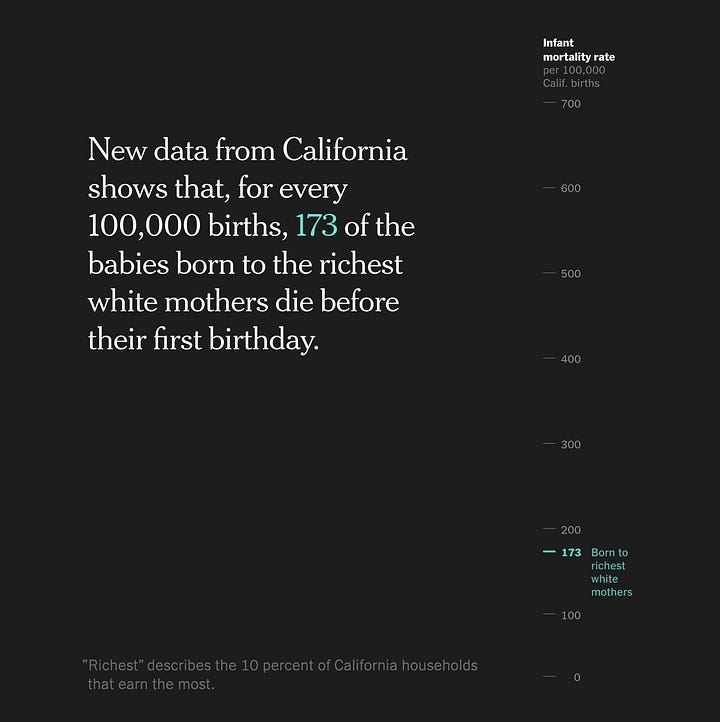



While provisional reporting from the CDC suggests the maternal mortality rate spiked in 2021 and continued to decrease as of June 2023, that still doesn’t mean that the issue will just go away on its own. We actually have to address it to protect mothers before it’s too late.
With all of that said, I asked my mom her thoughts:
Emily: Do you think we’re scared to talk about the maternal mortality rate in America—particularly amongst Black mothers? If so, why do you think that could be?
Danielle: Yes, definitely because our society can’t handle the truth, especially when it’s about how we are failing in some regard. But everyone should listen to Elaine Welteroth on this topic (and just about everything else in life as well).
In yet another No Shit! fact of the day, there are incredible individuals and organizations out there trying their best to fight maternal mortality rates. One such group is, as my mom cited, journalist Elaine Welteroth’s recently launched initiative, birthFUND. After raising money for a family and seeing midwifery's impact on their birth story, Welteroth set up a coalition fund to provide families and individuals with financial and medical support.
Back in 2022, when my mom and I discussed the overturning of Roe, we also briefly looked at the history of midwifery in the development of gynecology. If you’ll recall, before the Civil War,
the persons who performed all manner of reproductive health care were women—female midwives. Midwifery was interracial; half of the women who provided reproductive health care were Black women. Other midwives were Indigenous and white…Gynecologists explicitly revealed their motivations in undermining midwifery: They desired financial gains, recognition, and a monopoly…They believed that men should be paid, but not women—particularly not Black women (X).
By making midwifery accessible to mothers and families—a practice that “could avert more than 80% of maternal and infant deaths” and address many of the deadly concerns of the fourth trimester—birthFUND and its partner groups genuinely stand to make a difference in the harrowing landscape of American maternal mortality.
So yeah—listen to Elaine Welteroth!!!
I Am My Mother’s Child
Listen, I know I’m not the easiest person to live with. Not all of you jump up to defend my honor at once, please. But while I can blame a lot of who I am on how I was raised—the nature vs nurture debate has nothing on growing up with an Aries mother, pseudoscience my ass—my parents really did a great job of letting my siblings and I become our own people in our own ways. For better or worse, of course.
With all of this said and done, I wanted to know:
Emily: Be honest…do you like being my mother?
Danielle: I absolutely fucking love it!
…that was over a little too quickly. She probably just needed a more open-ended question to talk about how much joy I’ve brought to her life over the past 26 years, something like:
Emily: What are some things you wish you had known about motherhood before you had me?
Danielle: That you would be calling or texting me several times a day to make basic decisions for you in your 20s.
I’ve asked my parents if they’ve ever had any regrets in life (mid-pandemic, I want to say…late July 2020, drunk on red wine around 11:30 pm in our backyard), so I already know the answer to that question. But I was curious to know, after thinking and talking about the different stages of motherhood:
Emily: Is there anything you wish you had done differently?
Danielle: Taken more pictures of me with you guys (instead of me being behind the camera) when you were little.
Emily: Is there anything else I didn’t ask that you want to discuss?
Danielle: You didn’t touch on other aspects of being a mother—it’s not just about those who are mothers in the noun sense. There are those who mother in the verb sense and/or those who are motherly in the adjective sense. Women who may not have given birth to a child but are still considered mothers.
Part of the great good fortune of growing up with my mom as my own is her childhood best friends who came along with her as a package deal. I’ve called Dayna and Lauren my sister-moms for as long as I can remember not because we’re Real Housewives of Salt Lake City-style faux Mormons, but because that’s exactly what they’ve always been to me: more sisterly to me than my mom, but more motherly than my younger sister could be. In any case, my mom’s response has offered me a little corner of this piece to celebrate them too—I love you guys. You’re the best and only sister-moms a girl could ever have.
Before we ended today’s piece, I wanted to see if I could use my journalistic prowess (derogatory) and get my mom to answer, once and for all:
Emily: Who’s your favorite child????
Danielle: Katy.
Honestly…I’ll take it.
I’m so lucky to have been raised by Danni Lee and I’m so sorry to everyone else who wasn’t—better luck next time!!! Thank you a million to my mom for being the coolest person I know and 10000% the only one who can ever diagnose my ailment of the day!!!
We here at E4P know it’s not only cis women who can carry a child to term, but many of the same people who are anti-abortion are also transphobic—can you believe it??? So while it might be shorter to match their language and exclusively use the term women, I am notably not a Republican lawmaker slash conservative so I will be using inclusive terminology. If that ruffles your feathers, go DM J.K. Rowling about me xx
Sidebar: Alabama Governor Kay Ivey signed a law protecting IVF in the state (presumably so Alabamans could “have more kids”) but even with that, some healthcare providers—including a hospital in Mobile—announced it will stop providing IVF services later this year.
I should note that while there is a debate over how maternal mortality numbers are tracked and reported on an international scale and therefore how America should be regarded in comparison with other countries, the numbers according to the US-based health organizations are still not good at all.


